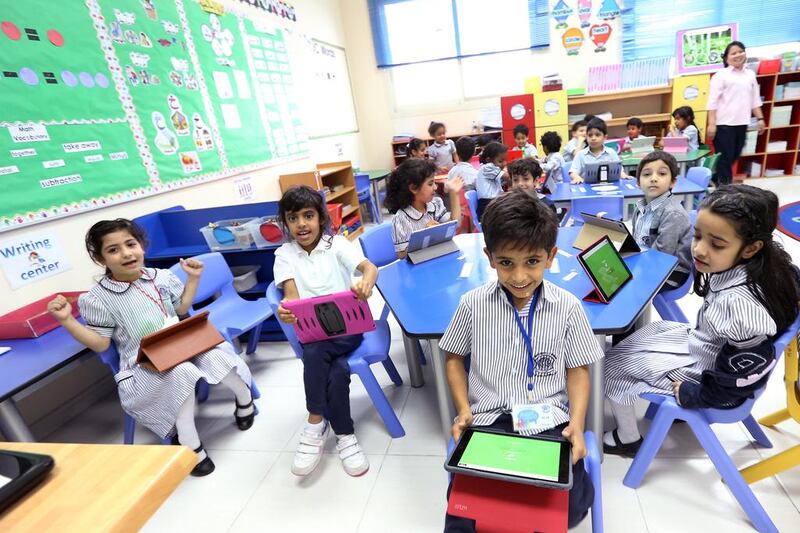Primary education matters more than we think. Education is an often-discussed topic in the Gulf media and within GCC societies. We take great pride in having a university education, as we should. But we also seem to be undervaluing the importance of primary education. Recently I happened to attend a school meeting where the topic of secondary and primary education was brought up. One side argued for more attention and finances to be allocated to those in secondary schooling, while the other side was vying to voice the importance of primary education. Resources are not endless and choices have to be made.
There is a vast amount of academic research on the importance of primary or early-learning schooling that is quite astounding. As a parent, I have become quite surprised by the data discovered while researching this topic. In a 2012 study by the University of London's Institute of Education, the point was clearly made about the importance of pre-school and primary education. It was argued that these early levels of education played a greater role in children's academic progress than other factors such as family background and gender. Two important takeaways were noted in that report. First, pre-school and primary school provide children with an essential lift for their later years. Second, home learning, and by that I assume the totality of home support, is equally important in someone's development. The study argued that as the more academically stimulating were the schools in the early ages (three to four years old) combined with higher parents' qualifications levels, the better outcomes would be for those students in later stage (ages seven to 11).
Education is evolving. What many of us learnt many decades ago has changed and is at times discounted. Old practices and theories have been replaced by new areas of learning. Education is a continuous process. The region, within a few decades, has been successful in providing education to almost every person. However, the main question today is how that evolves into a more qualitative system of education that transcends the need and attention of just tertiary (university) education into areas such as pre-schooling and primary world-class education.
The importance of learning two foreign languages in a more globalised world has been recognised by many. This was not the case three decades ago. Although much is being said about a world that might be de-globalising and about trade barriers being raised, the world is clearly being educated more globally now than ever before.
The region’s schools have come a long way in the past half-century.
According to the World Bank, it has quadrupled the average level of schooling since 1960, reduced illiteracy by half and achieved almost complete gender parity for primary education. Girls outperform boys from grade 4 maths to the end of grade 8. Science and maths are crucial; however, almost two-thirds of university students in the Mena countries read for humanities and arts degrees, as per the World Bank.
The UAE is undertaking some important reforms in education. As per the UAE National Qualifications Authority, there were a mere 2,000 students in 20 schools in 1962; that rose to more than 750,000 students in 2013. Significant progress has been made over the years with pre-primary enrolment of 79.4 per cent and adult literacy reaching 90 per cent, as per Unesco. The UAE has identified in its Vision 2021 National Agenda that education is an important driver for transforming the nation into a knowledge economy.
Saudi Arabia has gone through a similar transformative process. Starting in 1945 and within seven years, the kingdom had established more than 220 schools. Saudi Arabia now has more than 50 public and private universities and colleges.
The 2011 Arab Knowledge Report shows children’s rates of enrolment in pre-primary education programmes varied. The UAE and Kuwait, for example, were close to developed countries’ experience, whereas the rates in Iraq, Libya and Saudi Arabia were below the global average.
Transforming a nation into a knowledge-based economy that requires complex changes in the education system is not easy. The solution to the complexity of the problem starts at the level of teachers and principals. Many countries in the region need to address quality of education issues rather than merely building capacity.
Curriculum content has to change to produce critical thinking from an early age. Teachers need to be motivated to improve their skills and become better educators. However, education has to be viewed as a starting point and not the solution to all the challenges facing an economy. It is often argued that the lack of decent jobs is due to the lack of education. This is only partially correct. The lack of good jobs is partially a supply issue but also a demand issue. The quality of education is very much the by-product of what is required by an economy. Gulf economies are still bound by low-skilled and low-wage dynamics.
The first six years of a child’s education are considered to be the “golden years” that form the basis of all progress in subsequent years. What can policymakers do? Most experts agree that maths skills at an early (primary) school age need more focus. More early-grade mathematics is needed to improve children’s test scores in later years. Notwithstanding the complexity of labour and education, Gulf economies need to keep on addressing primary schooling needs.
John Sfakianakis is the director of economic research at the Gulf Research Centre in Riyadh.
business@thenational.ae
Follow The National's Business section on Twitter





